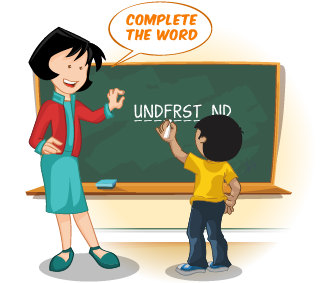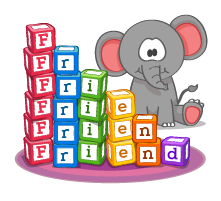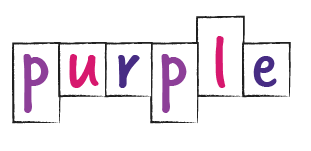|
If you are unable to view our Newsletter Issue 64, August 2019 on your mobile or desktop, click here to view them online.
|
| |
 |
|
Issue 64 | August 2019
|

|
 |
|
Becoming a confident speller can be a challenge. To learn spelling words effectively, use strategies that are appropriate to the child’s age and the type of words being studied.
A) Regular words and how to spell them
 Regular words can be spelled according to the sequence of the sounds they contain (e.g. ‘mat’, ‘cataract’, ‘understanding’). They can be grouped into word families based on their spelling patterns, and they tend to follow rules. So:
Regular words can be spelled according to the sequence of the sounds they contain (e.g. ‘mat’, ‘cataract’, ‘understanding’). They can be grouped into word families based on their spelling patterns, and they tend to follow rules. So:
- Use phonological awareness. Listen to the sounds that make up a word and write down the corresponding letter(s) in the correct order.
- Think of other words that share the same spelling pattern. A child who can spell ‘ball’ can easily spell ‘fall’, ‘call’, ‘tall’ and ‘small’ etc.
- Learn useful spelling rules, and understand when and how to use them.
B) Sight words and how to spell them
Sight words don’t look like they sound (e.g. ‘said’, ‘one’, ‘isosceles’). These are often high-frequency words that children really need to know. They may include silent letters (like the ‘i’ in ‘friend’), or just not follow the rules. So:
- Use multi-sensory activities like rainbow writing, using a finger to write the word in sand or shaving foam spread over a table-top, or moulding the letters out of play-doh.
- Use colourful magnetic letters to form the word on a baking sheet. Jumble the letters up and then unscramble them. Remove a letter and say what has gone missing.
- Say the word aloud as it is spelled and remember the quirky pronunciation to help with writing it down (e.g. ‘know’ as ‘kay-now’ rather than to rhyme with ‘no’).
|
|
 |
|
 Victoria Hobbs
Victoria Hobbs
Educational Therapist
BSc in Psychology, United Kingdom
Victoria started working with children in the UK, supporting children with autism, cerebral palsy, ADHD, and developmental delays. She also spent time in a mainstream school helping young children learn to read and write, and teaching them to enjoy stories and books. Victoria is an avid reader and would like every child to experience reading as a pleasure rather than a chore.
10 questions with our employee spotlight of the month, click here.
|
|
 |
|
National Day Promotion
|
|
Celebrate National Day with Dynamics!
|
|
Enjoy $54 off on Speech or Occupational Therapy assessments. As an additional bonus, enjoy another $54 off package price, if paid on the same day as the assessment.
|
| |
|
|
| We are now Open! |
| Dynamics International School is now open and accepting enrollment. We accept students all year round, depending on availability and space. If your child is between Reception year and Grade 2 level, call us at 61009235 or go to www.dynamics.school to find out more about the school. |
 |
|
|
| |
 |
|
General Spelling Tips
1. Look at the word.
Count the letters. Use colour to highlight silent letters or unusual patterns. Look for stand-out features like double letters, repeated letters, or hidden words inside (e.g. ‘elephANT’).
2. Know how to read the word, and what it means.
Create and illustrate a sentence containing the word. Practise saying it loud and using it in conversation. Link the word to other words that are related by either meaning or spelling.
3. Separate longer words into chunks.
Split them into syllables or identify roots and affixes. Common prefixes (e.g. ‘dis’) and suffixes (e.g. ‘tion’) can be learned separately. Practise writing or reciting one chunk at a time and then recombine them. This will lessen the load on memory.
4. Split a spelling list into sections.
Work on three or four words at a time. If possible, pick out those which share a spelling pattern or common feature to be learned together. Revise them the next day. This will help avoid any frustration or anxiety.
5. Make spelling enjoyable!
Try different activities that engage children’s interest more than repetitive writing or reciting.  Create word-shapes, build letter pyramids, or come up with mnemonics (the ‘o-u-l-d’ sequence in ‘could’ can be remembered as ‘Oh U Lucky Duck). High-interest information is retained in memory more readily, and motivation is an important element of successful learning. Create word-shapes, build letter pyramids, or come up with mnemonics (the ‘o-u-l-d’ sequence in ‘could’ can be remembered as ‘Oh U Lucky Duck). High-interest information is retained in memory more readily, and motivation is an important element of successful learning.
|
|
 |
|
Dynamics Therapy Centre for Kids is affiliated with:
|
We have a large team of speech and language therapists, occupational therapists,
educational therapists, psychologists, teachers & all supported by our administration team.
You can be assured that at Dynamics you only get the best, from the best!
Please contact for more information details at 6734 2634 | 6100 9235 or email inquiry@dynamics.com.sg |
|
Dynamics Therapy Centre for Kids Pte Ltd
583 Orchard Road Forum The Shopping Mall
Singapore 238884 |
|
| © Dynamics Therapy Centre for Kids Pte Ltd. All rights reserved. |
|
|



